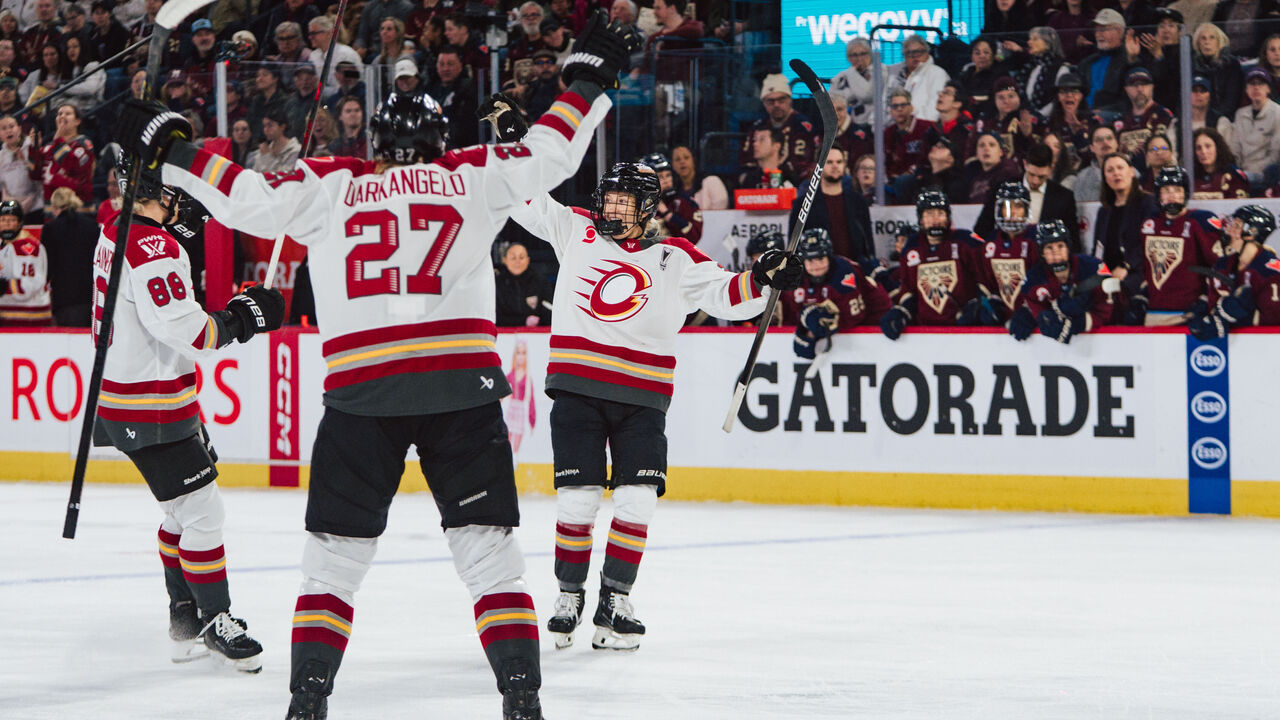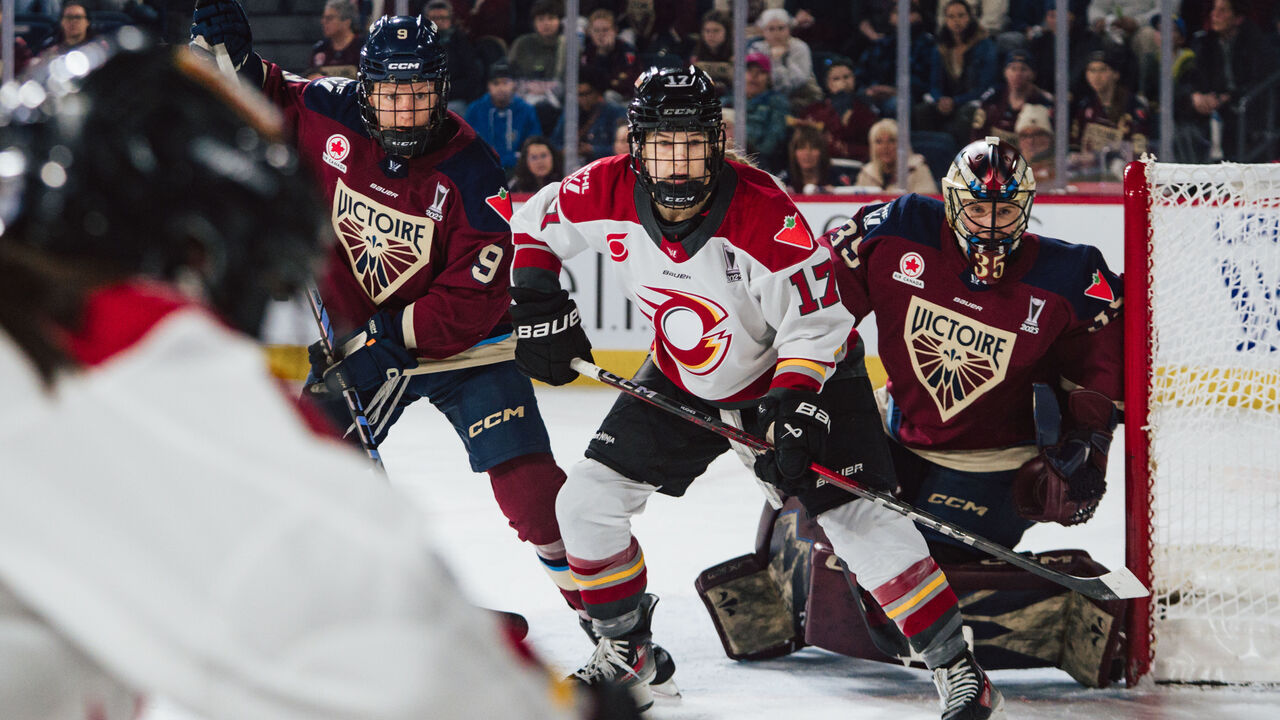Mustard, pickle juice, and 334 minutes of PWHL history
They were five hours in. Muscles seizing. Legs spent. On the Ottawa bench, a strange sight: mustard packets, taped in rows like emergency rations.
The now-viral image captured by reporter Kelly Greig showed what it took to survive the longest game in PWHL history - a five-hour, 34-minute epic clash between Ottawa and Montreal that stretched into quadruple overtime and pushed players to their absolute limits. Montreal's win evened the best-of-five series at one apiece.
The goal on the bench: Delay muscle cramps as long as possible to retain a competitive edge.
"There are two things that have been rooted in evidence-based practice, and it's pickle juice and mustard," Ottawa head athletic therapist Amanda Deluca said. She usually packs both for team road trips, but this time she didn't. When it became apparent the game was going long, she texted a shopping list to the Charge's front office, who scoured Place Bell for the goods.
Soon enough, they were delivered to the Charge locker room. They weren't allowed to have pickle juice on the bench, but the mustard packets were OK. To start, Ottawa's athletic therapists kept them in their pockets. It was the equipment manager who realized it'd be easier for the players to tape them to the glass.
The @PWHL_Ottawa trainers have started taping packs of mustard to the bench. Apparently eating mustard can prevent cramping after playing for this long. pic.twitter.com/Wk8PKjwvaS
— Kelly Greig (@KellyGreig) May 11, 2025
"It was a true team effort because not only did we have all of that going, we also had our strength coach and our massage therapist also working behind the scenes, making peanut butter and Nutella or peanut butter and jelly sandwiches for fast, easy, digestible carbs to just keep their energy levels up," Deluca said. She picked up these tricks in her five years as an athletic therapist in the CFL, which included a trip to the Grey Cup in 2022 with the Toronto Argonauts.
Gatorade is usually her first line of defense. "The sugar and the salt and the carbs in Gatorade are going to delay muscle cramps and going to give you the energy you need to keep going. It wasn't until they were almost tired of drinking Gatorade, or we needed something extra, that I switched to the mustard," Deluca said.

Both mustard and pickle juice disrupt the transient receptor potential channels to delay cramps by interrupting the body's communication system. "Anything with a strong taste, like wasabi, could do the same," Deluca said. "It just delays the onset of exertional muscle cramps."
Montreal also jumped on the pickle juice remedy. "We were just trying to fuel and hydrate as much as possible," said Montreal forward Kristin O'Neill, who opened the scoring early in the first period and assisted on Catherine Dubois' game-winning goal. "Pickle juice was definitely out there. That was kind of a unique one … I definitely tried it to avoid muscle cramps."
Events like the one that unfolded at Place Bell on Sunday aren't just a war of attrition on the day, they become a test of how fast you can recover when you've essentially played two full games and have less than 48 hours before the puck drops for Game 3 on Tuesday.
The Charge drove back to Ottawa after Sunday's game, and Deluca and her staff spent more than 12 hours administering treatments at the team facility. "They've all been put on a good nutrition regime - they're all individually looked after with our team nutritionist to help decrease the amount of inflammation in their body," Deluca said. "(Monday) is just strictly a recovery day."
The Victoire also used Monday for recovery and travel. "There's nothing too special that I wouldn't be doing after a game anyways," O'Neill said. "With the tight turnaround, just getting as much rest and sleep as possible is super important. And using Normatec, massage therapists, and ice baths."

Montreal head coach Kori Cheverie said the team was given the day off - only players who did not skate in Game 2 attended practice. "We want the players to be rested, physically, emotionally, mentally, and ready to go for (Game 3). So you know, less hockey talk, and more recovery for them," she said.
Cheverie felt her team got stronger as the overtimes wore on. "We started to narrow our focus. We started to talk less about all the X's and O's and more about a mindset," she said. "By the time we got going into that fourth overtime, we certainly had narrowed and just wanted to allow them to rest and recover as much as they possibly could. And the same for our staff … In order for us to be sharp on the bench, it was important for us to refuel and energize ourselves."
For Montreal, the ending was also a kind of redemption. Exactly 365 days earlier, they were on the losing side of the longest game in league history - a triple-overtime heartbreaker against Boston.
"We're one more year experienced as a team, one more year experienced as a coaching staff," Cheverie said. "We've worked really hard on the mental preparation side of what this could look like."
Even though that game stretched into the history books, it's unlikely players from either side will dwell on it for long. "Especially in this playoff world where games are so close together, I think it's important to celebrate after the game, but soon after we have to move on and be focused for the next," O'Neill said.
Jolene Latimer is a feature writer at theScore.
HEADLINES
- Report: Jazz's Markkanen suffers ankle, hip injuries in practice
- Report: Pirates, No. 1 prospect Griffin open to extension
- Sasaki gives up 3 runs over 1 1/3 innings during spring debut
- Brown's next team: Who is most likely to pry WR away from Eagles?
- Skenes loses 4 strikes to ABS challenges in spring debut